BMP6003 Report: UK Business Call Centre in Japan - HRM & Culture
VerifiedAdded on 2023/01/10
|12
|4168
|92
Report
AI Summary
This report critically evaluates the cultural and Human Resource Management (HRM) issues that UK companies must consider when establishing a call center in Japan. The report begins with an introduction defining key terms such as international HRM, call centers, globalization, and internationalization of businesses, setting the stage for a discussion of the challenges. Task 1 analyzes cultural issues, including business meeting protocols, negotiation processes, translation difficulties, customer service expectations, and cultural diversity. It also applies Handy's cultural theory (role, task, person, and power cultures) and Hofstede's cultural dimensions theory (power distance, individualism vs. collectivism, masculinity vs. femininity) to the context of a UK company (Sainsbury's) setting up a call center in Japan. Task 2 examines HRM issues, such as recruitment, training, and employee relations, considering cultural differences and their impact on management practices. The report concludes with a synthesis of the key challenges and recommendations for UK companies to successfully navigate the Japanese business environment.
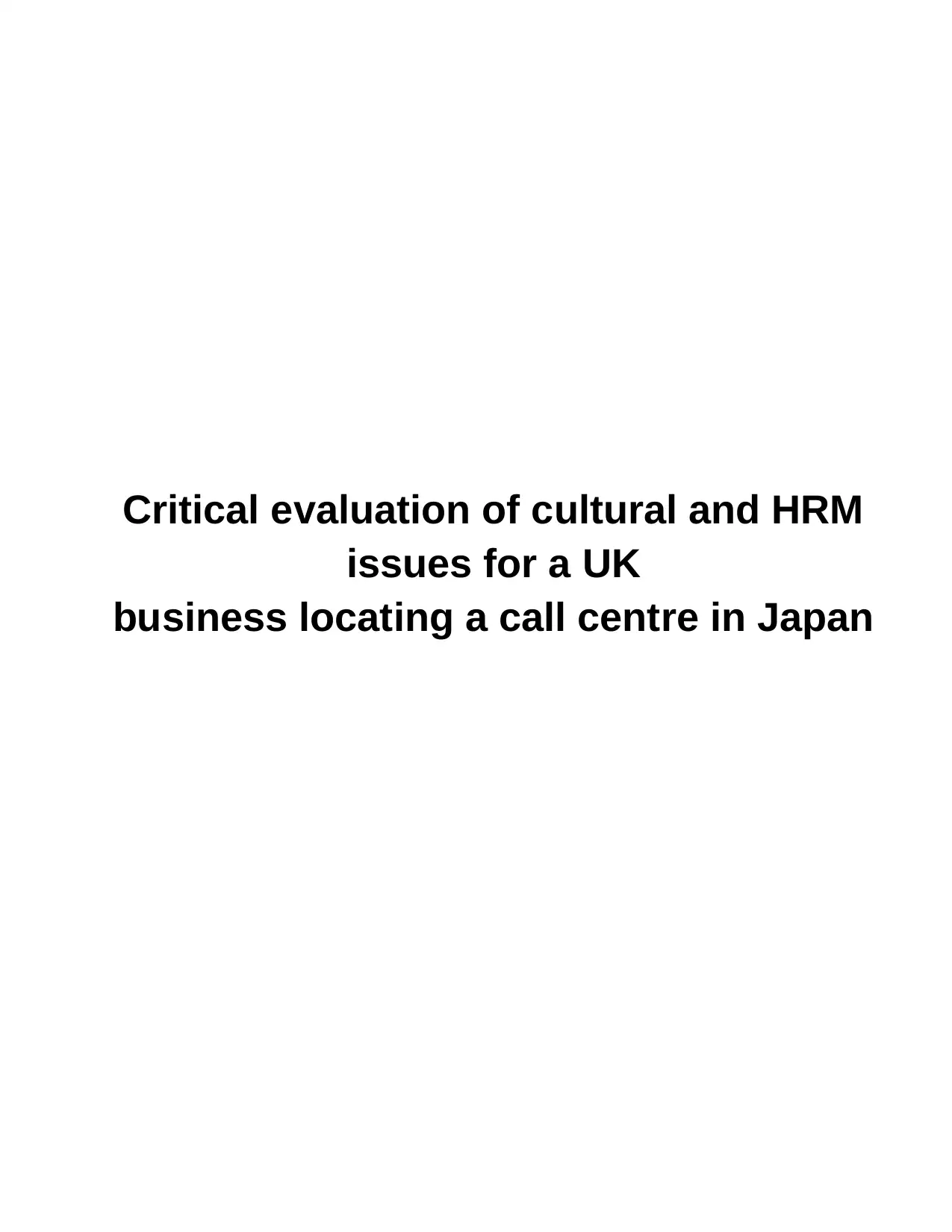
Critical evaluation of cultural and HRM
issues for a UK
business locating a call centre in Japan
issues for a UK
business locating a call centre in Japan
Paraphrase This Document
Need a fresh take? Get an instant paraphrase of this document with our AI Paraphraser
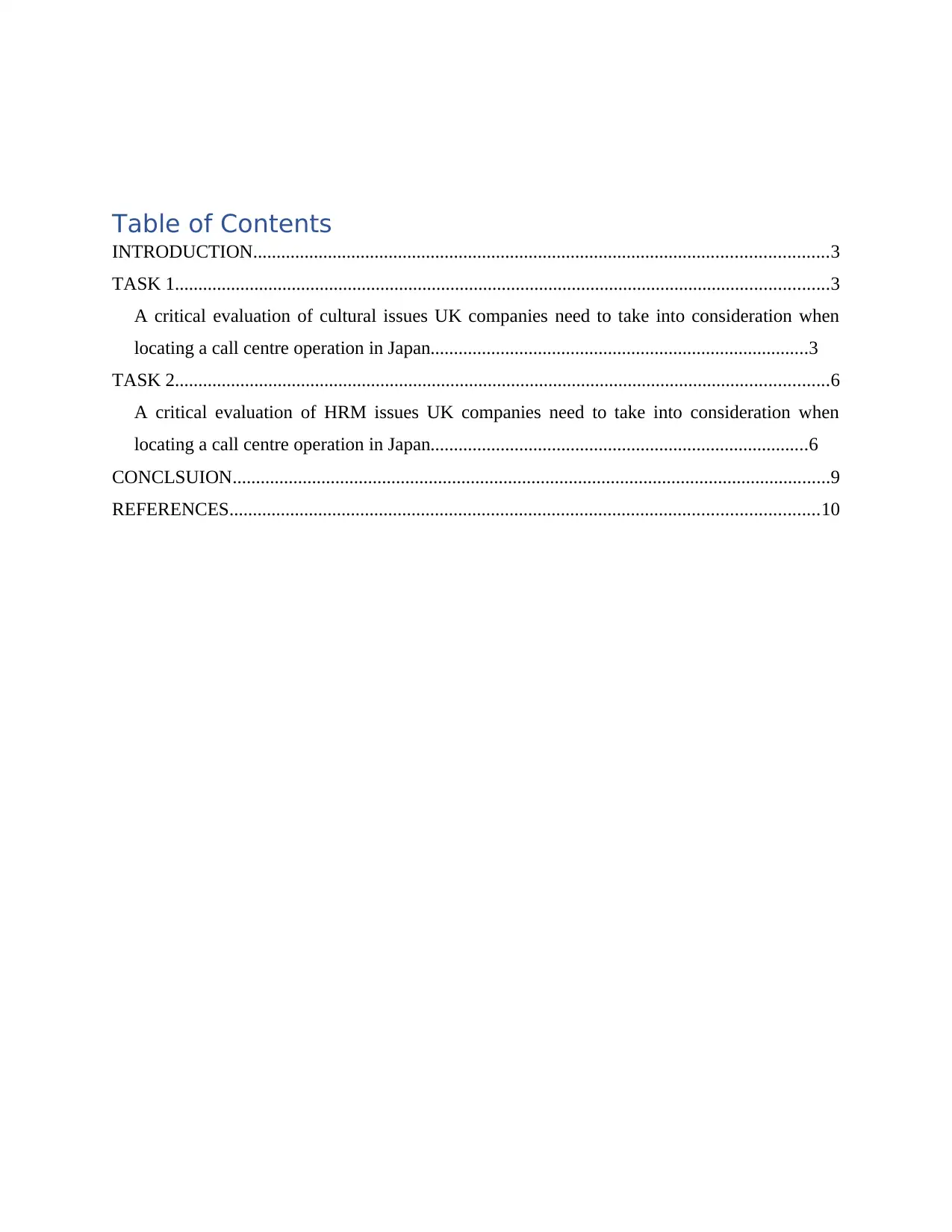
Table of Contents
INTRODUCTION...........................................................................................................................3
TASK 1............................................................................................................................................3
A critical evaluation of cultural issues UK companies need to take into consideration when
locating a call centre operation in Japan.................................................................................3
TASK 2............................................................................................................................................6
A critical evaluation of HRM issues UK companies need to take into consideration when
locating a call centre operation in Japan.................................................................................6
CONCLSUION................................................................................................................................9
REFERENCES..............................................................................................................................10
INTRODUCTION...........................................................................................................................3
TASK 1............................................................................................................................................3
A critical evaluation of cultural issues UK companies need to take into consideration when
locating a call centre operation in Japan.................................................................................3
TASK 2............................................................................................................................................6
A critical evaluation of HRM issues UK companies need to take into consideration when
locating a call centre operation in Japan.................................................................................6
CONCLSUION................................................................................................................................9
REFERENCES..............................................................................................................................10
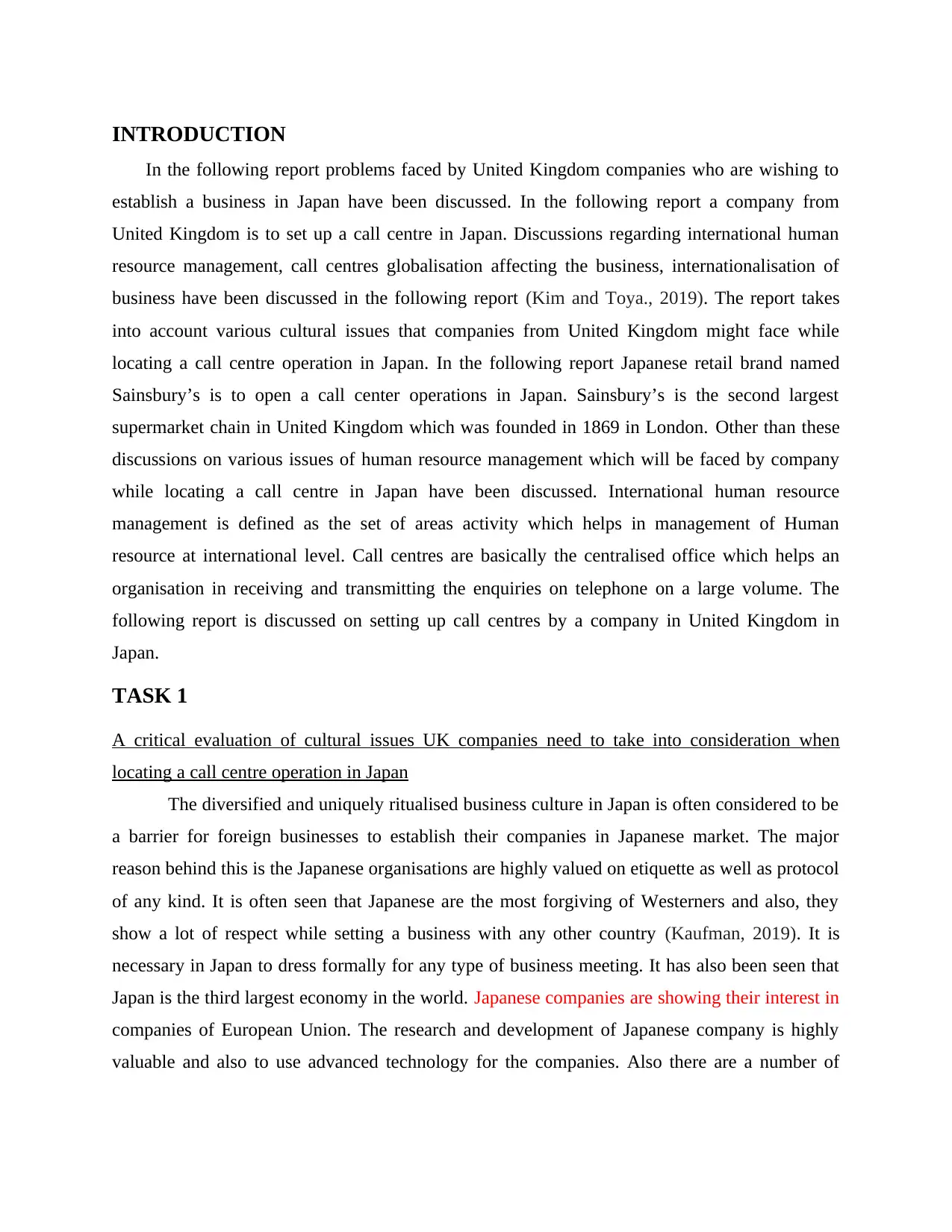
INTRODUCTION
In the following report problems faced by United Kingdom companies who are wishing to
establish a business in Japan have been discussed. In the following report a company from
United Kingdom is to set up a call centre in Japan. Discussions regarding international human
resource management, call centres globalisation affecting the business, internationalisation of
business have been discussed in the following report (Kim and Toya., 2019). The report takes
into account various cultural issues that companies from United Kingdom might face while
locating a call centre operation in Japan. In the following report Japanese retail brand named
Sainsbury’s is to open a call center operations in Japan. Sainsbury’s is the second largest
supermarket chain in United Kingdom which was founded in 1869 in London. Other than these
discussions on various issues of human resource management which will be faced by company
while locating a call centre in Japan have been discussed. International human resource
management is defined as the set of areas activity which helps in management of Human
resource at international level. Call centres are basically the centralised office which helps an
organisation in receiving and transmitting the enquiries on telephone on a large volume. The
following report is discussed on setting up call centres by a company in United Kingdom in
Japan.
TASK 1
A critical evaluation of cultural issues UK companies need to take into consideration when
locating a call centre operation in Japan
The diversified and uniquely ritualised business culture in Japan is often considered to be
a barrier for foreign businesses to establish their companies in Japanese market. The major
reason behind this is the Japanese organisations are highly valued on etiquette as well as protocol
of any kind. It is often seen that Japanese are the most forgiving of Westerners and also, they
show a lot of respect while setting a business with any other country (Kaufman, 2019). It is
necessary in Japan to dress formally for any type of business meeting. It has also been seen that
Japan is the third largest economy in the world. Japanese companies are showing their interest in
companies of European Union. The research and development of Japanese company is highly
valuable and also to use advanced technology for the companies. Also there are a number of
In the following report problems faced by United Kingdom companies who are wishing to
establish a business in Japan have been discussed. In the following report a company from
United Kingdom is to set up a call centre in Japan. Discussions regarding international human
resource management, call centres globalisation affecting the business, internationalisation of
business have been discussed in the following report (Kim and Toya., 2019). The report takes
into account various cultural issues that companies from United Kingdom might face while
locating a call centre operation in Japan. In the following report Japanese retail brand named
Sainsbury’s is to open a call center operations in Japan. Sainsbury’s is the second largest
supermarket chain in United Kingdom which was founded in 1869 in London. Other than these
discussions on various issues of human resource management which will be faced by company
while locating a call centre in Japan have been discussed. International human resource
management is defined as the set of areas activity which helps in management of Human
resource at international level. Call centres are basically the centralised office which helps an
organisation in receiving and transmitting the enquiries on telephone on a large volume. The
following report is discussed on setting up call centres by a company in United Kingdom in
Japan.
TASK 1
A critical evaluation of cultural issues UK companies need to take into consideration when
locating a call centre operation in Japan
The diversified and uniquely ritualised business culture in Japan is often considered to be
a barrier for foreign businesses to establish their companies in Japanese market. The major
reason behind this is the Japanese organisations are highly valued on etiquette as well as protocol
of any kind. It is often seen that Japanese are the most forgiving of Westerners and also, they
show a lot of respect while setting a business with any other country (Kaufman, 2019). It is
necessary in Japan to dress formally for any type of business meeting. It has also been seen that
Japan is the third largest economy in the world. Japanese companies are showing their interest in
companies of European Union. The research and development of Japanese company is highly
valuable and also to use advanced technology for the companies. Also there are a number of
⊘ This is a preview!⊘
Do you want full access?
Subscribe today to unlock all pages.

Trusted by 1+ million students worldwide
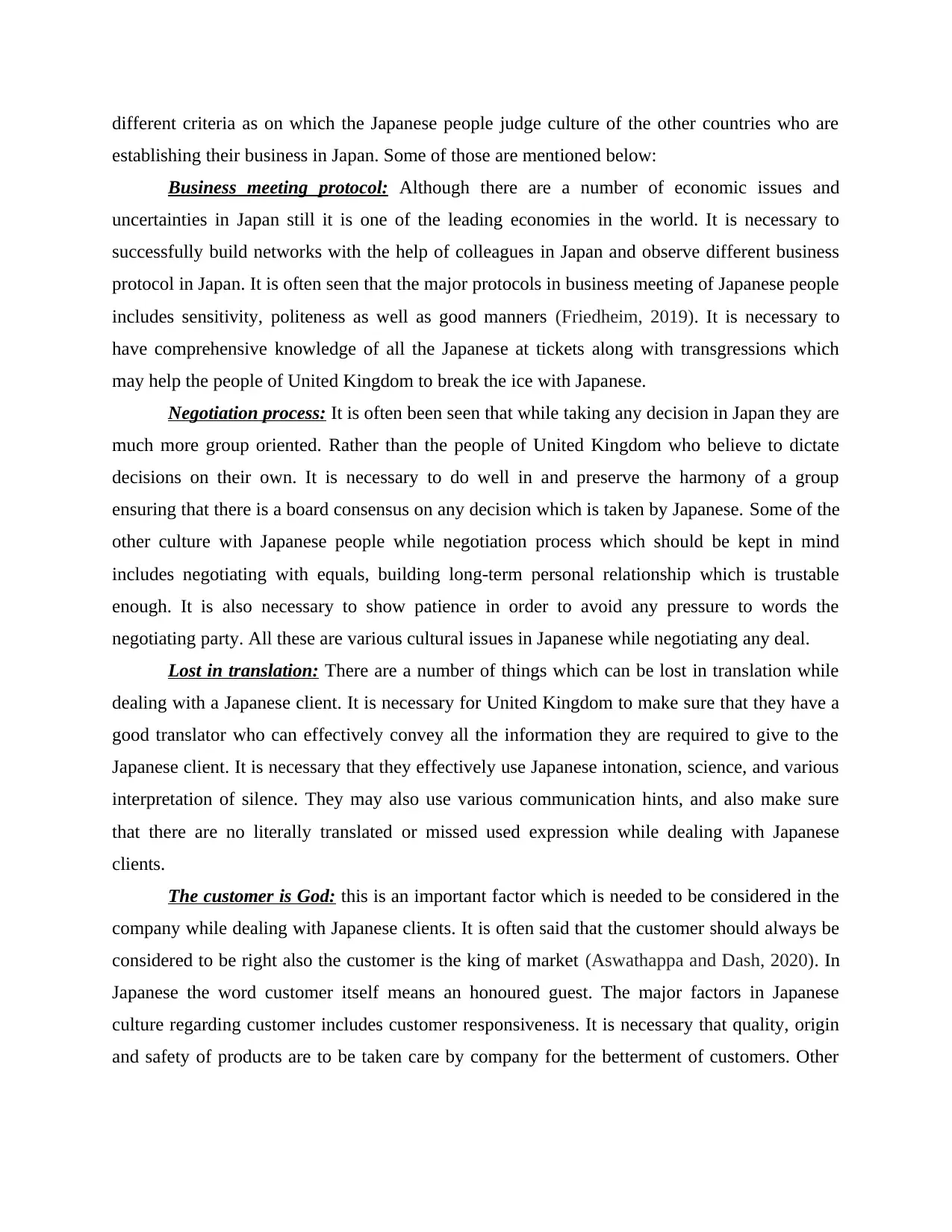
different criteria as on which the Japanese people judge culture of the other countries who are
establishing their business in Japan. Some of those are mentioned below:
Business meeting protocol: Although there are a number of economic issues and
uncertainties in Japan still it is one of the leading economies in the world. It is necessary to
successfully build networks with the help of colleagues in Japan and observe different business
protocol in Japan. It is often seen that the major protocols in business meeting of Japanese people
includes sensitivity, politeness as well as good manners (Friedheim, 2019). It is necessary to
have comprehensive knowledge of all the Japanese at tickets along with transgressions which
may help the people of United Kingdom to break the ice with Japanese.
Negotiation process: It is often been seen that while taking any decision in Japan they are
much more group oriented. Rather than the people of United Kingdom who believe to dictate
decisions on their own. It is necessary to do well in and preserve the harmony of a group
ensuring that there is a board consensus on any decision which is taken by Japanese. Some of the
other culture with Japanese people while negotiation process which should be kept in mind
includes negotiating with equals, building long-term personal relationship which is trustable
enough. It is also necessary to show patience in order to avoid any pressure to words the
negotiating party. All these are various cultural issues in Japanese while negotiating any deal.
Lost in translation: There are a number of things which can be lost in translation while
dealing with a Japanese client. It is necessary for United Kingdom to make sure that they have a
good translator who can effectively convey all the information they are required to give to the
Japanese client. It is necessary that they effectively use Japanese intonation, science, and various
interpretation of silence. They may also use various communication hints, and also make sure
that there are no literally translated or missed used expression while dealing with Japanese
clients.
The customer is God: this is an important factor which is needed to be considered in the
company while dealing with Japanese clients. It is often said that the customer should always be
considered to be right also the customer is the king of market (Aswathappa and Dash, 2020). In
Japanese the word customer itself means an honoured guest. The major factors in Japanese
culture regarding customer includes customer responsiveness. It is necessary that quality, origin
and safety of products are to be taken care by company for the betterment of customers. Other
establishing their business in Japan. Some of those are mentioned below:
Business meeting protocol: Although there are a number of economic issues and
uncertainties in Japan still it is one of the leading economies in the world. It is necessary to
successfully build networks with the help of colleagues in Japan and observe different business
protocol in Japan. It is often seen that the major protocols in business meeting of Japanese people
includes sensitivity, politeness as well as good manners (Friedheim, 2019). It is necessary to
have comprehensive knowledge of all the Japanese at tickets along with transgressions which
may help the people of United Kingdom to break the ice with Japanese.
Negotiation process: It is often been seen that while taking any decision in Japan they are
much more group oriented. Rather than the people of United Kingdom who believe to dictate
decisions on their own. It is necessary to do well in and preserve the harmony of a group
ensuring that there is a board consensus on any decision which is taken by Japanese. Some of the
other culture with Japanese people while negotiation process which should be kept in mind
includes negotiating with equals, building long-term personal relationship which is trustable
enough. It is also necessary to show patience in order to avoid any pressure to words the
negotiating party. All these are various cultural issues in Japanese while negotiating any deal.
Lost in translation: There are a number of things which can be lost in translation while
dealing with a Japanese client. It is necessary for United Kingdom to make sure that they have a
good translator who can effectively convey all the information they are required to give to the
Japanese client. It is necessary that they effectively use Japanese intonation, science, and various
interpretation of silence. They may also use various communication hints, and also make sure
that there are no literally translated or missed used expression while dealing with Japanese
clients.
The customer is God: this is an important factor which is needed to be considered in the
company while dealing with Japanese clients. It is often said that the customer should always be
considered to be right also the customer is the king of market (Aswathappa and Dash, 2020). In
Japanese the word customer itself means an honoured guest. The major factors in Japanese
culture regarding customer includes customer responsiveness. It is necessary that quality, origin
and safety of products are to be taken care by company for the betterment of customers. Other
Paraphrase This Document
Need a fresh take? Get an instant paraphrase of this document with our AI Paraphraser
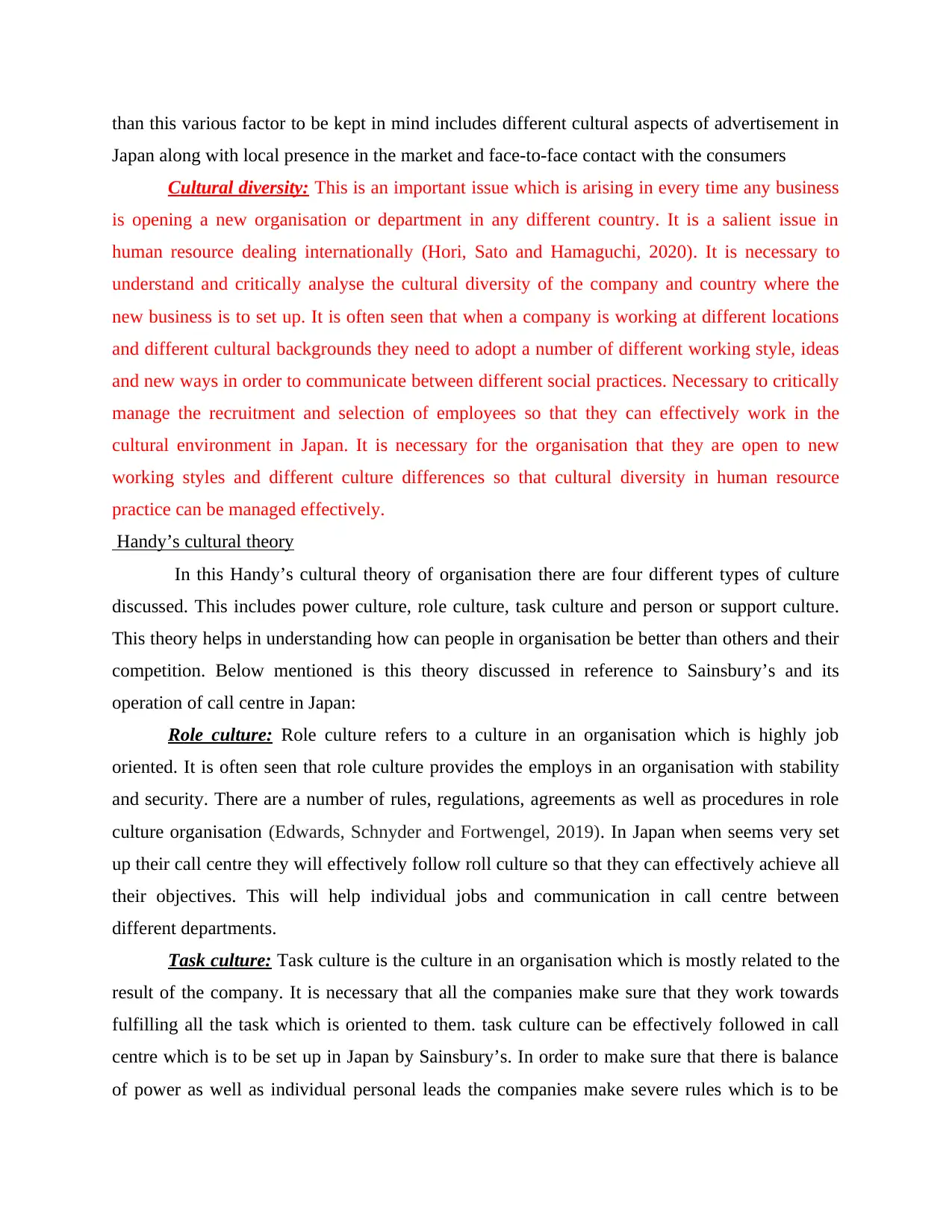
than this various factor to be kept in mind includes different cultural aspects of advertisement in
Japan along with local presence in the market and face-to-face contact with the consumers
Cultural diversity: This is an important issue which is arising in every time any business
is opening a new organisation or department in any different country. It is a salient issue in
human resource dealing internationally (Hori, Sato and Hamaguchi, 2020). It is necessary to
understand and critically analyse the cultural diversity of the company and country where the
new business is to set up. It is often seen that when a company is working at different locations
and different cultural backgrounds they need to adopt a number of different working style, ideas
and new ways in order to communicate between different social practices. Necessary to critically
manage the recruitment and selection of employees so that they can effectively work in the
cultural environment in Japan. It is necessary for the organisation that they are open to new
working styles and different culture differences so that cultural diversity in human resource
practice can be managed effectively.
Handy’s cultural theory
In this Handy’s cultural theory of organisation there are four different types of culture
discussed. This includes power culture, role culture, task culture and person or support culture.
This theory helps in understanding how can people in organisation be better than others and their
competition. Below mentioned is this theory discussed in reference to Sainsbury’s and its
operation of call centre in Japan:
Role culture: Role culture refers to a culture in an organisation which is highly job
oriented. It is often seen that role culture provides the employs in an organisation with stability
and security. There are a number of rules, regulations, agreements as well as procedures in role
culture organisation (Edwards, Schnyder and Fortwengel, 2019). In Japan when seems very set
up their call centre they will effectively follow roll culture so that they can effectively achieve all
their objectives. This will help individual jobs and communication in call centre between
different departments.
Task culture: Task culture is the culture in an organisation which is mostly related to the
result of the company. It is necessary that all the companies make sure that they work towards
fulfilling all the task which is oriented to them. task culture can be effectively followed in call
centre which is to be set up in Japan by Sainsbury’s. In order to make sure that there is balance
of power as well as individual personal leads the companies make severe rules which is to be
Japan along with local presence in the market and face-to-face contact with the consumers
Cultural diversity: This is an important issue which is arising in every time any business
is opening a new organisation or department in any different country. It is a salient issue in
human resource dealing internationally (Hori, Sato and Hamaguchi, 2020). It is necessary to
understand and critically analyse the cultural diversity of the company and country where the
new business is to set up. It is often seen that when a company is working at different locations
and different cultural backgrounds they need to adopt a number of different working style, ideas
and new ways in order to communicate between different social practices. Necessary to critically
manage the recruitment and selection of employees so that they can effectively work in the
cultural environment in Japan. It is necessary for the organisation that they are open to new
working styles and different culture differences so that cultural diversity in human resource
practice can be managed effectively.
Handy’s cultural theory
In this Handy’s cultural theory of organisation there are four different types of culture
discussed. This includes power culture, role culture, task culture and person or support culture.
This theory helps in understanding how can people in organisation be better than others and their
competition. Below mentioned is this theory discussed in reference to Sainsbury’s and its
operation of call centre in Japan:
Role culture: Role culture refers to a culture in an organisation which is highly job
oriented. It is often seen that role culture provides the employs in an organisation with stability
and security. There are a number of rules, regulations, agreements as well as procedures in role
culture organisation (Edwards, Schnyder and Fortwengel, 2019). In Japan when seems very set
up their call centre they will effectively follow roll culture so that they can effectively achieve all
their objectives. This will help individual jobs and communication in call centre between
different departments.
Task culture: Task culture is the culture in an organisation which is mostly related to the
result of the company. It is necessary that all the companies make sure that they work towards
fulfilling all the task which is oriented to them. task culture can be effectively followed in call
centre which is to be set up in Japan by Sainsbury’s. In order to make sure that there is balance
of power as well as individual personal leads the companies make severe rules which is to be
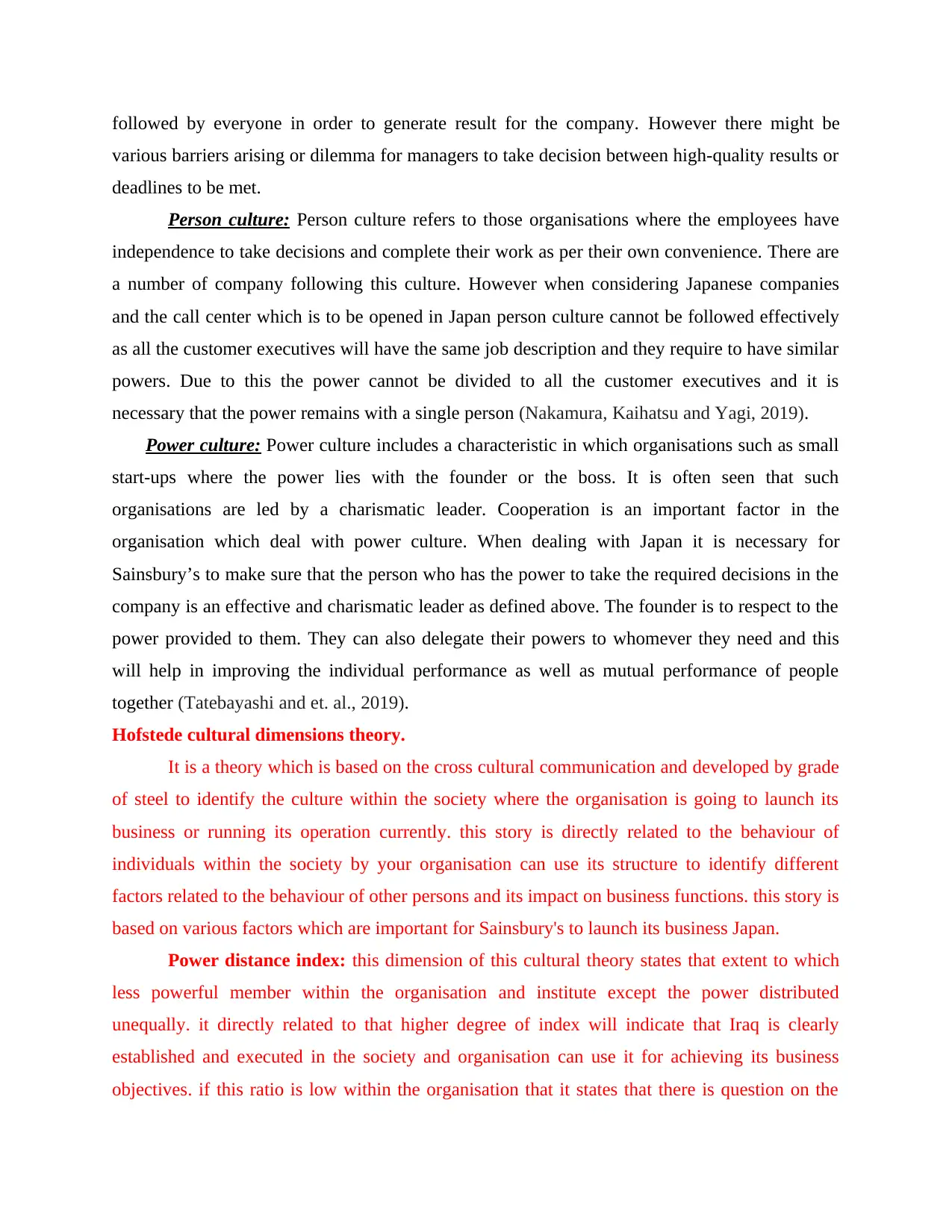
followed by everyone in order to generate result for the company. However there might be
various barriers arising or dilemma for managers to take decision between high-quality results or
deadlines to be met.
Person culture: Person culture refers to those organisations where the employees have
independence to take decisions and complete their work as per their own convenience. There are
a number of company following this culture. However when considering Japanese companies
and the call center which is to be opened in Japan person culture cannot be followed effectively
as all the customer executives will have the same job description and they require to have similar
powers. Due to this the power cannot be divided to all the customer executives and it is
necessary that the power remains with a single person (Nakamura, Kaihatsu and Yagi, 2019).
Power culture: Power culture includes a characteristic in which organisations such as small
start-ups where the power lies with the founder or the boss. It is often seen that such
organisations are led by a charismatic leader. Cooperation is an important factor in the
organisation which deal with power culture. When dealing with Japan it is necessary for
Sainsbury’s to make sure that the person who has the power to take the required decisions in the
company is an effective and charismatic leader as defined above. The founder is to respect to the
power provided to them. They can also delegate their powers to whomever they need and this
will help in improving the individual performance as well as mutual performance of people
together (Tatebayashi and et. al., 2019).
Hofstede cultural dimensions theory.
It is a theory which is based on the cross cultural communication and developed by grade
of steel to identify the culture within the society where the organisation is going to launch its
business or running its operation currently. this story is directly related to the behaviour of
individuals within the society by your organisation can use its structure to identify different
factors related to the behaviour of other persons and its impact on business functions. this story is
based on various factors which are important for Sainsbury's to launch its business Japan.
Power distance index: this dimension of this cultural theory states that extent to which
less powerful member within the organisation and institute except the power distributed
unequally. it directly related to that higher degree of index will indicate that Iraq is clearly
established and executed in the society and organisation can use it for achieving its business
objectives. if this ratio is low within the organisation that it states that there is question on the
various barriers arising or dilemma for managers to take decision between high-quality results or
deadlines to be met.
Person culture: Person culture refers to those organisations where the employees have
independence to take decisions and complete their work as per their own convenience. There are
a number of company following this culture. However when considering Japanese companies
and the call center which is to be opened in Japan person culture cannot be followed effectively
as all the customer executives will have the same job description and they require to have similar
powers. Due to this the power cannot be divided to all the customer executives and it is
necessary that the power remains with a single person (Nakamura, Kaihatsu and Yagi, 2019).
Power culture: Power culture includes a characteristic in which organisations such as small
start-ups where the power lies with the founder or the boss. It is often seen that such
organisations are led by a charismatic leader. Cooperation is an important factor in the
organisation which deal with power culture. When dealing with Japan it is necessary for
Sainsbury’s to make sure that the person who has the power to take the required decisions in the
company is an effective and charismatic leader as defined above. The founder is to respect to the
power provided to them. They can also delegate their powers to whomever they need and this
will help in improving the individual performance as well as mutual performance of people
together (Tatebayashi and et. al., 2019).
Hofstede cultural dimensions theory.
It is a theory which is based on the cross cultural communication and developed by grade
of steel to identify the culture within the society where the organisation is going to launch its
business or running its operation currently. this story is directly related to the behaviour of
individuals within the society by your organisation can use its structure to identify different
factors related to the behaviour of other persons and its impact on business functions. this story is
based on various factors which are important for Sainsbury's to launch its business Japan.
Power distance index: this dimension of this cultural theory states that extent to which
less powerful member within the organisation and institute except the power distributed
unequally. it directly related to that higher degree of index will indicate that Iraq is clearly
established and executed in the society and organisation can use it for achieving its business
objectives. if this ratio is low within the organisation that it states that there is question on the
⊘ This is a preview!⊘
Do you want full access?
Subscribe today to unlock all pages.

Trusted by 1+ million students worldwide
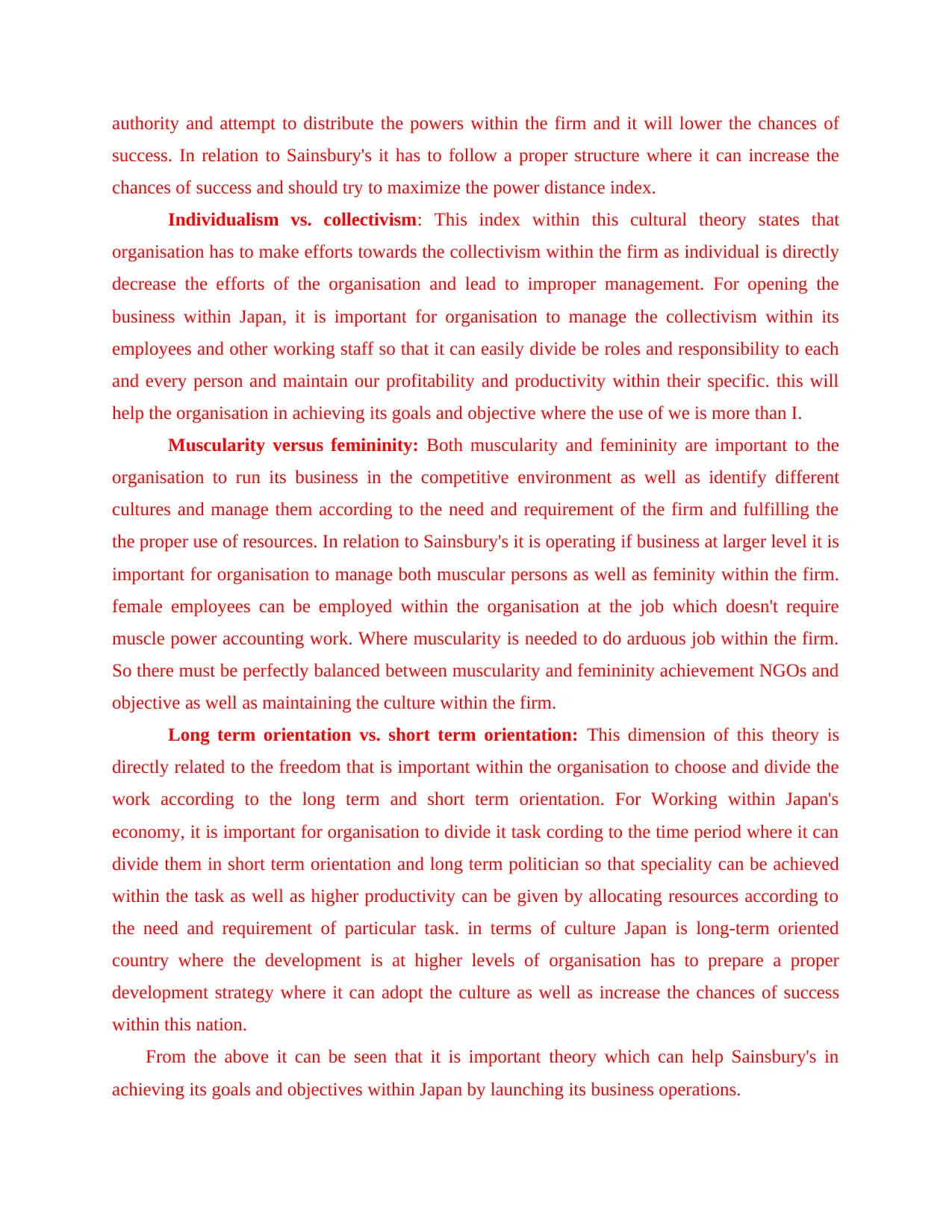
authority and attempt to distribute the powers within the firm and it will lower the chances of
success. In relation to Sainsbury's it has to follow a proper structure where it can increase the
chances of success and should try to maximize the power distance index.
Individualism vs. collectivism: This index within this cultural theory states that
organisation has to make efforts towards the collectivism within the firm as individual is directly
decrease the efforts of the organisation and lead to improper management. For opening the
business within Japan, it is important for organisation to manage the collectivism within its
employees and other working staff so that it can easily divide be roles and responsibility to each
and every person and maintain our profitability and productivity within their specific. this will
help the organisation in achieving its goals and objective where the use of we is more than I.
Muscularity versus femininity: Both muscularity and femininity are important to the
organisation to run its business in the competitive environment as well as identify different
cultures and manage them according to the need and requirement of the firm and fulfilling the
the proper use of resources. In relation to Sainsbury's it is operating if business at larger level it is
important for organisation to manage both muscular persons as well as feminity within the firm.
female employees can be employed within the organisation at the job which doesn't require
muscle power accounting work. Where muscularity is needed to do arduous job within the firm.
So there must be perfectly balanced between muscularity and femininity achievement NGOs and
objective as well as maintaining the culture within the firm.
Long term orientation vs. short term orientation: This dimension of this theory is
directly related to the freedom that is important within the organisation to choose and divide the
work according to the long term and short term orientation. For Working within Japan's
economy, it is important for organisation to divide it task cording to the time period where it can
divide them in short term orientation and long term politician so that speciality can be achieved
within the task as well as higher productivity can be given by allocating resources according to
the need and requirement of particular task. in terms of culture Japan is long-term oriented
country where the development is at higher levels of organisation has to prepare a proper
development strategy where it can adopt the culture as well as increase the chances of success
within this nation.
From the above it can be seen that it is important theory which can help Sainsbury's in
achieving its goals and objectives within Japan by launching its business operations.
success. In relation to Sainsbury's it has to follow a proper structure where it can increase the
chances of success and should try to maximize the power distance index.
Individualism vs. collectivism: This index within this cultural theory states that
organisation has to make efforts towards the collectivism within the firm as individual is directly
decrease the efforts of the organisation and lead to improper management. For opening the
business within Japan, it is important for organisation to manage the collectivism within its
employees and other working staff so that it can easily divide be roles and responsibility to each
and every person and maintain our profitability and productivity within their specific. this will
help the organisation in achieving its goals and objective where the use of we is more than I.
Muscularity versus femininity: Both muscularity and femininity are important to the
organisation to run its business in the competitive environment as well as identify different
cultures and manage them according to the need and requirement of the firm and fulfilling the
the proper use of resources. In relation to Sainsbury's it is operating if business at larger level it is
important for organisation to manage both muscular persons as well as feminity within the firm.
female employees can be employed within the organisation at the job which doesn't require
muscle power accounting work. Where muscularity is needed to do arduous job within the firm.
So there must be perfectly balanced between muscularity and femininity achievement NGOs and
objective as well as maintaining the culture within the firm.
Long term orientation vs. short term orientation: This dimension of this theory is
directly related to the freedom that is important within the organisation to choose and divide the
work according to the long term and short term orientation. For Working within Japan's
economy, it is important for organisation to divide it task cording to the time period where it can
divide them in short term orientation and long term politician so that speciality can be achieved
within the task as well as higher productivity can be given by allocating resources according to
the need and requirement of particular task. in terms of culture Japan is long-term oriented
country where the development is at higher levels of organisation has to prepare a proper
development strategy where it can adopt the culture as well as increase the chances of success
within this nation.
From the above it can be seen that it is important theory which can help Sainsbury's in
achieving its goals and objectives within Japan by launching its business operations.
Paraphrase This Document
Need a fresh take? Get an instant paraphrase of this document with our AI Paraphraser
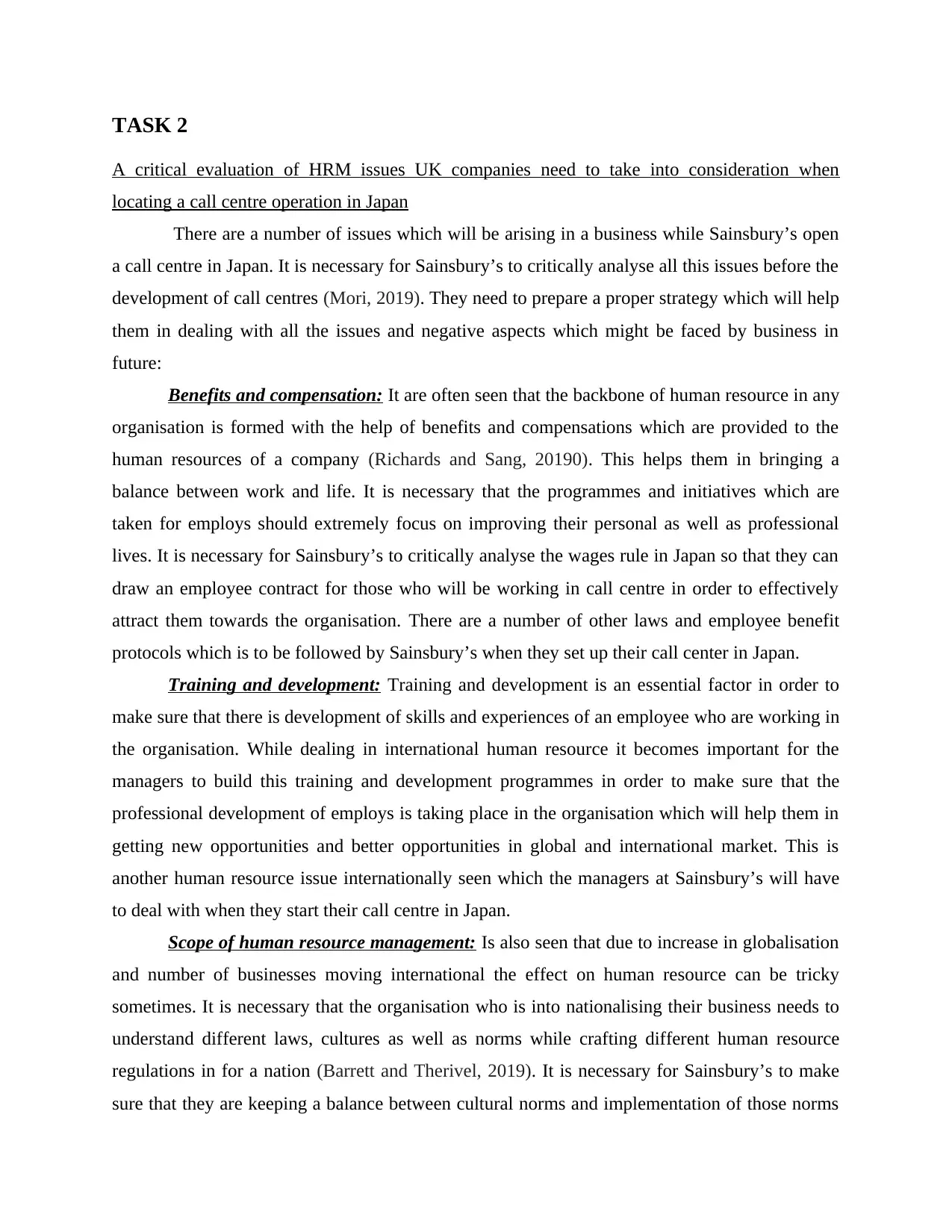
TASK 2
A critical evaluation of HRM issues UK companies need to take into consideration when
locating a call centre operation in Japan
There are a number of issues which will be arising in a business while Sainsbury’s open
a call centre in Japan. It is necessary for Sainsbury’s to critically analyse all this issues before the
development of call centres (Mori, 2019). They need to prepare a proper strategy which will help
them in dealing with all the issues and negative aspects which might be faced by business in
future:
Benefits and compensation: It are often seen that the backbone of human resource in any
organisation is formed with the help of benefits and compensations which are provided to the
human resources of a company (Richards and Sang, 20190). This helps them in bringing a
balance between work and life. It is necessary that the programmes and initiatives which are
taken for employs should extremely focus on improving their personal as well as professional
lives. It is necessary for Sainsbury’s to critically analyse the wages rule in Japan so that they can
draw an employee contract for those who will be working in call centre in order to effectively
attract them towards the organisation. There are a number of other laws and employee benefit
protocols which is to be followed by Sainsbury’s when they set up their call center in Japan.
Training and development: Training and development is an essential factor in order to
make sure that there is development of skills and experiences of an employee who are working in
the organisation. While dealing in international human resource it becomes important for the
managers to build this training and development programmes in order to make sure that the
professional development of employs is taking place in the organisation which will help them in
getting new opportunities and better opportunities in global and international market. This is
another human resource issue internationally seen which the managers at Sainsbury’s will have
to deal with when they start their call centre in Japan.
Scope of human resource management: Is also seen that due to increase in globalisation
and number of businesses moving international the effect on human resource can be tricky
sometimes. It is necessary that the organisation who is into nationalising their business needs to
understand different laws, cultures as well as norms while crafting different human resource
regulations in for a nation (Barrett and Therivel, 2019). It is necessary for Sainsbury’s to make
sure that they are keeping a balance between cultural norms and implementation of those norms
A critical evaluation of HRM issues UK companies need to take into consideration when
locating a call centre operation in Japan
There are a number of issues which will be arising in a business while Sainsbury’s open
a call centre in Japan. It is necessary for Sainsbury’s to critically analyse all this issues before the
development of call centres (Mori, 2019). They need to prepare a proper strategy which will help
them in dealing with all the issues and negative aspects which might be faced by business in
future:
Benefits and compensation: It are often seen that the backbone of human resource in any
organisation is formed with the help of benefits and compensations which are provided to the
human resources of a company (Richards and Sang, 20190). This helps them in bringing a
balance between work and life. It is necessary that the programmes and initiatives which are
taken for employs should extremely focus on improving their personal as well as professional
lives. It is necessary for Sainsbury’s to critically analyse the wages rule in Japan so that they can
draw an employee contract for those who will be working in call centre in order to effectively
attract them towards the organisation. There are a number of other laws and employee benefit
protocols which is to be followed by Sainsbury’s when they set up their call center in Japan.
Training and development: Training and development is an essential factor in order to
make sure that there is development of skills and experiences of an employee who are working in
the organisation. While dealing in international human resource it becomes important for the
managers to build this training and development programmes in order to make sure that the
professional development of employs is taking place in the organisation which will help them in
getting new opportunities and better opportunities in global and international market. This is
another human resource issue internationally seen which the managers at Sainsbury’s will have
to deal with when they start their call centre in Japan.
Scope of human resource management: Is also seen that due to increase in globalisation
and number of businesses moving international the effect on human resource can be tricky
sometimes. It is necessary that the organisation who is into nationalising their business needs to
understand different laws, cultures as well as norms while crafting different human resource
regulations in for a nation (Barrett and Therivel, 2019). It is necessary for Sainsbury’s to make
sure that they are keeping a balance between cultural norms and implementation of those norms
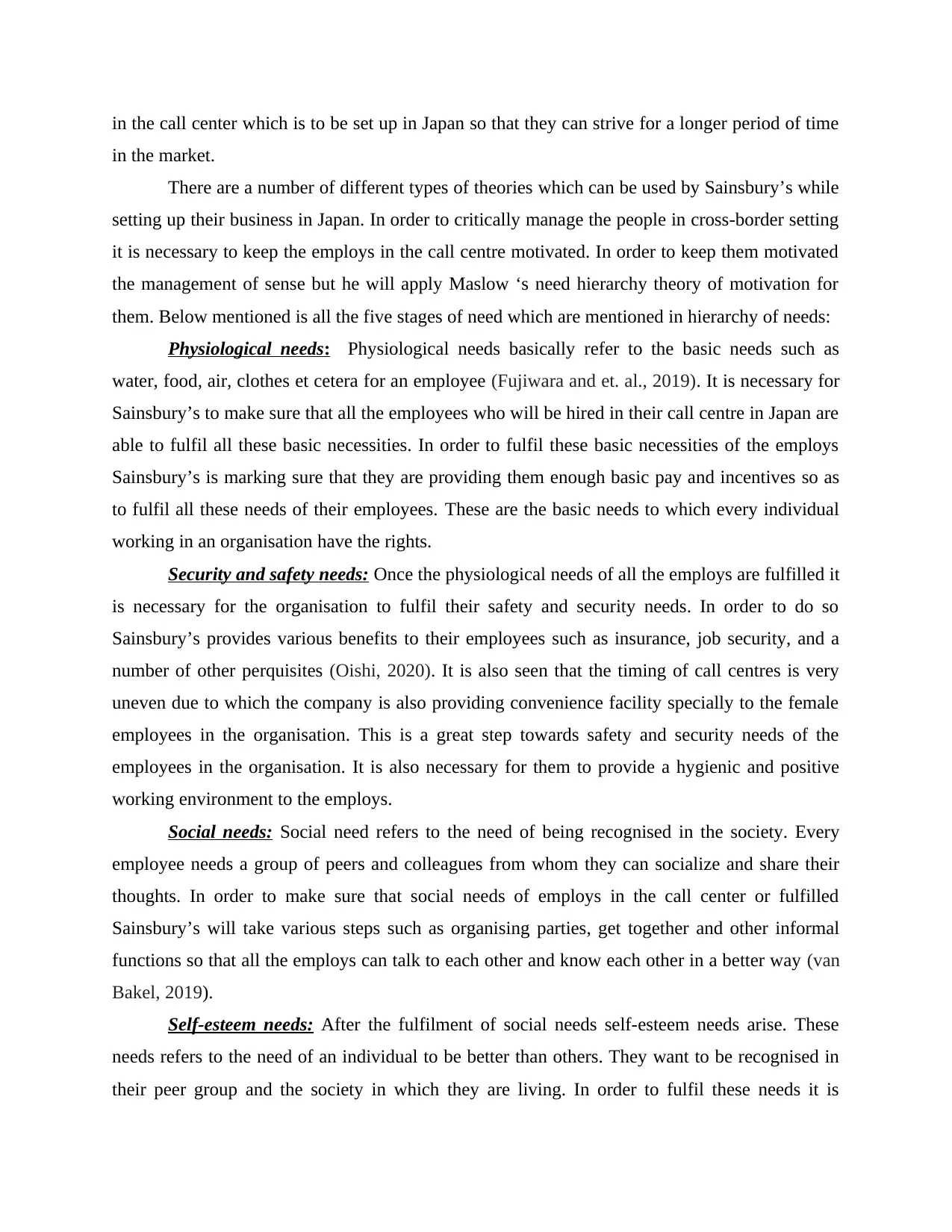
in the call center which is to be set up in Japan so that they can strive for a longer period of time
in the market.
There are a number of different types of theories which can be used by Sainsbury’s while
setting up their business in Japan. In order to critically manage the people in cross-border setting
it is necessary to keep the employs in the call centre motivated. In order to keep them motivated
the management of sense but he will apply Maslow ‘s need hierarchy theory of motivation for
them. Below mentioned is all the five stages of need which are mentioned in hierarchy of needs:
Physiological needs: Physiological needs basically refer to the basic needs such as
water, food, air, clothes et cetera for an employee (Fujiwara and et. al., 2019). It is necessary for
Sainsbury’s to make sure that all the employees who will be hired in their call centre in Japan are
able to fulfil all these basic necessities. In order to fulfil these basic necessities of the employs
Sainsbury’s is marking sure that they are providing them enough basic pay and incentives so as
to fulfil all these needs of their employees. These are the basic needs to which every individual
working in an organisation have the rights.
Security and safety needs: Once the physiological needs of all the employs are fulfilled it
is necessary for the organisation to fulfil their safety and security needs. In order to do so
Sainsbury’s provides various benefits to their employees such as insurance, job security, and a
number of other perquisites (Oishi, 2020). It is also seen that the timing of call centres is very
uneven due to which the company is also providing convenience facility specially to the female
employees in the organisation. This is a great step towards safety and security needs of the
employees in the organisation. It is also necessary for them to provide a hygienic and positive
working environment to the employs.
Social needs: Social need refers to the need of being recognised in the society. Every
employee needs a group of peers and colleagues from whom they can socialize and share their
thoughts. In order to make sure that social needs of employs in the call center or fulfilled
Sainsbury’s will take various steps such as organising parties, get together and other informal
functions so that all the employs can talk to each other and know each other in a better way (van
Bakel, 2019).
Self-esteem needs: After the fulfilment of social needs self-esteem needs arise. These
needs refers to the need of an individual to be better than others. They want to be recognised in
their peer group and the society in which they are living. In order to fulfil these needs it is
in the market.
There are a number of different types of theories which can be used by Sainsbury’s while
setting up their business in Japan. In order to critically manage the people in cross-border setting
it is necessary to keep the employs in the call centre motivated. In order to keep them motivated
the management of sense but he will apply Maslow ‘s need hierarchy theory of motivation for
them. Below mentioned is all the five stages of need which are mentioned in hierarchy of needs:
Physiological needs: Physiological needs basically refer to the basic needs such as
water, food, air, clothes et cetera for an employee (Fujiwara and et. al., 2019). It is necessary for
Sainsbury’s to make sure that all the employees who will be hired in their call centre in Japan are
able to fulfil all these basic necessities. In order to fulfil these basic necessities of the employs
Sainsbury’s is marking sure that they are providing them enough basic pay and incentives so as
to fulfil all these needs of their employees. These are the basic needs to which every individual
working in an organisation have the rights.
Security and safety needs: Once the physiological needs of all the employs are fulfilled it
is necessary for the organisation to fulfil their safety and security needs. In order to do so
Sainsbury’s provides various benefits to their employees such as insurance, job security, and a
number of other perquisites (Oishi, 2020). It is also seen that the timing of call centres is very
uneven due to which the company is also providing convenience facility specially to the female
employees in the organisation. This is a great step towards safety and security needs of the
employees in the organisation. It is also necessary for them to provide a hygienic and positive
working environment to the employs.
Social needs: Social need refers to the need of being recognised in the society. Every
employee needs a group of peers and colleagues from whom they can socialize and share their
thoughts. In order to make sure that social needs of employs in the call center or fulfilled
Sainsbury’s will take various steps such as organising parties, get together and other informal
functions so that all the employs can talk to each other and know each other in a better way (van
Bakel, 2019).
Self-esteem needs: After the fulfilment of social needs self-esteem needs arise. These
needs refers to the need of an individual to be better than others. They want to be recognised in
their peer group and the society in which they are living. In order to fulfil these needs it is
⊘ This is a preview!⊘
Do you want full access?
Subscribe today to unlock all pages.

Trusted by 1+ million students worldwide
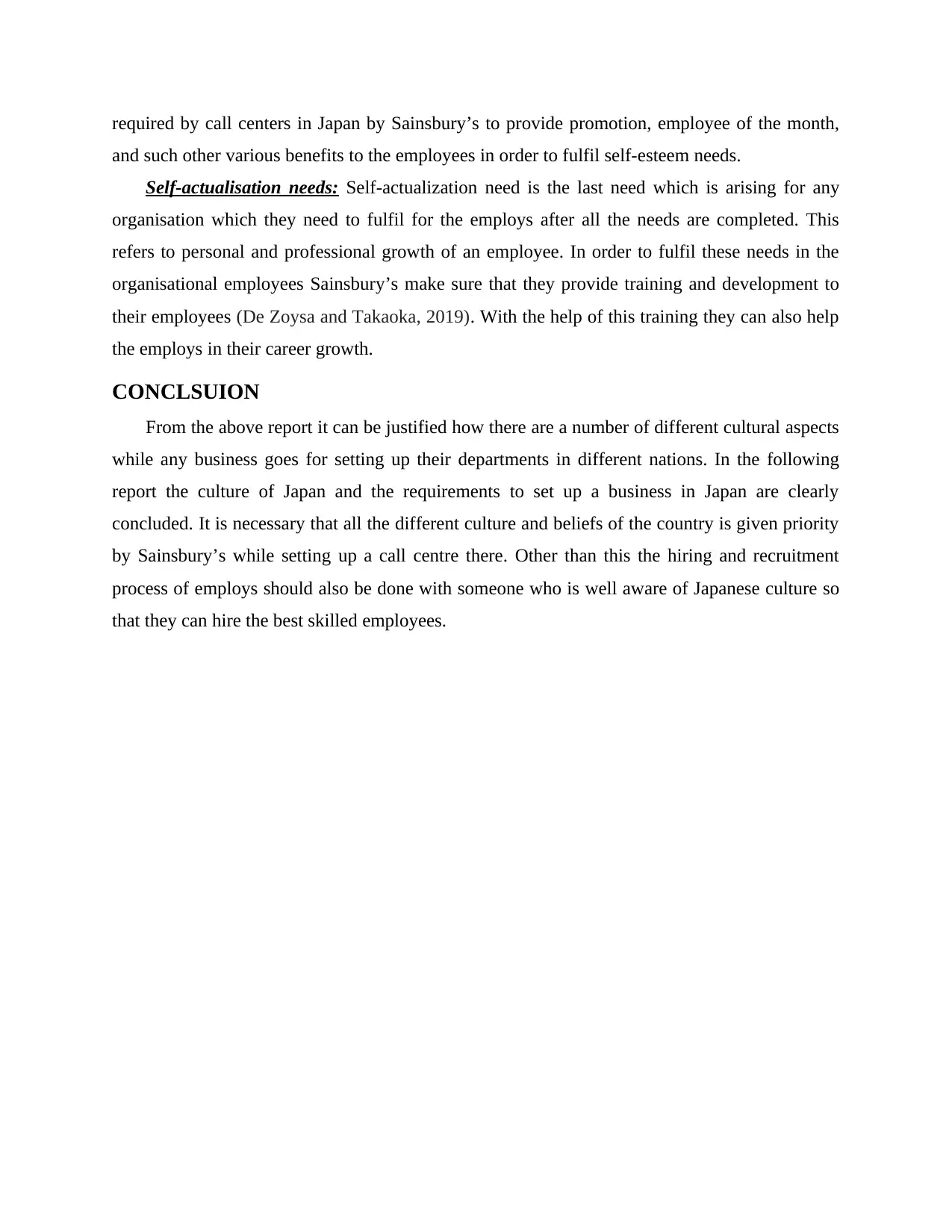
required by call centers in Japan by Sainsbury’s to provide promotion, employee of the month,
and such other various benefits to the employees in order to fulfil self-esteem needs.
Self-actualisation needs: Self-actualization need is the last need which is arising for any
organisation which they need to fulfil for the employs after all the needs are completed. This
refers to personal and professional growth of an employee. In order to fulfil these needs in the
organisational employees Sainsbury’s make sure that they provide training and development to
their employees (De Zoysa and Takaoka, 2019). With the help of this training they can also help
the employs in their career growth.
CONCLSUION
From the above report it can be justified how there are a number of different cultural aspects
while any business goes for setting up their departments in different nations. In the following
report the culture of Japan and the requirements to set up a business in Japan are clearly
concluded. It is necessary that all the different culture and beliefs of the country is given priority
by Sainsbury’s while setting up a call centre there. Other than this the hiring and recruitment
process of employs should also be done with someone who is well aware of Japanese culture so
that they can hire the best skilled employees.
and such other various benefits to the employees in order to fulfil self-esteem needs.
Self-actualisation needs: Self-actualization need is the last need which is arising for any
organisation which they need to fulfil for the employs after all the needs are completed. This
refers to personal and professional growth of an employee. In order to fulfil these needs in the
organisational employees Sainsbury’s make sure that they provide training and development to
their employees (De Zoysa and Takaoka, 2019). With the help of this training they can also help
the employs in their career growth.
CONCLSUION
From the above report it can be justified how there are a number of different cultural aspects
while any business goes for setting up their departments in different nations. In the following
report the culture of Japan and the requirements to set up a business in Japan are clearly
concluded. It is necessary that all the different culture and beliefs of the country is given priority
by Sainsbury’s while setting up a call centre there. Other than this the hiring and recruitment
process of employs should also be done with someone who is well aware of Japanese culture so
that they can hire the best skilled employees.
Paraphrase This Document
Need a fresh take? Get an instant paraphrase of this document with our AI Paraphraser
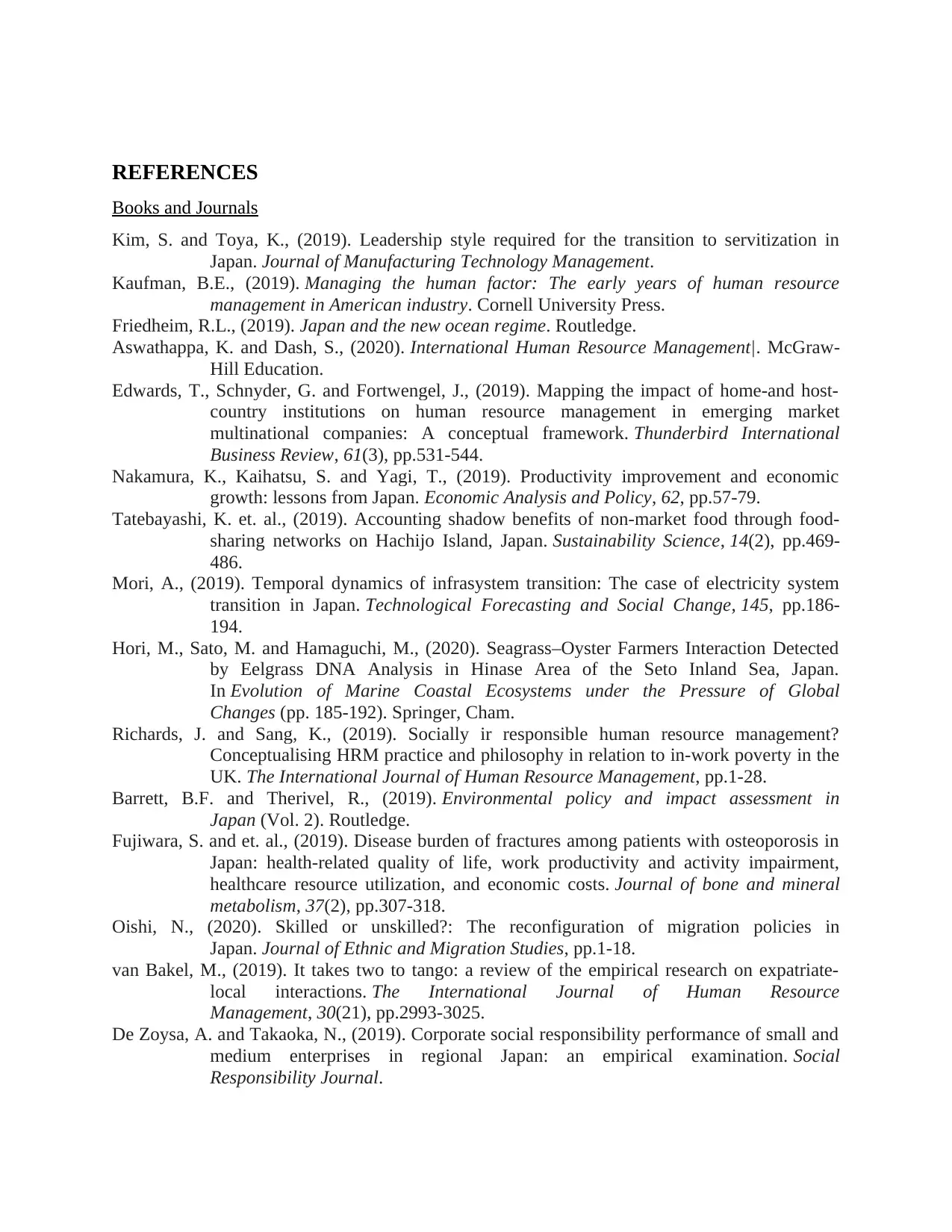
REFERENCES
Books and Journals
Kim, S. and Toya, K., (2019). Leadership style required for the transition to servitization in
Japan. Journal of Manufacturing Technology Management.
Kaufman, B.E., (2019). Managing the human factor: The early years of human resource
management in American industry. Cornell University Press.
Friedheim, R.L., (2019). Japan and the new ocean regime. Routledge.
Aswathappa, K. and Dash, S., (2020). International Human Resource Management|. McGraw-
Hill Education.
Edwards, T., Schnyder, G. and Fortwengel, J., (2019). Mapping the impact of home‐and host‐
country institutions on human resource management in emerging market
multinational companies: A conceptual framework. Thunderbird International
Business Review, 61(3), pp.531-544.
Nakamura, K., Kaihatsu, S. and Yagi, T., (2019). Productivity improvement and economic
growth: lessons from Japan. Economic Analysis and Policy, 62, pp.57-79.
Tatebayashi, K. et. al., (2019). Accounting shadow benefits of non-market food through food-
sharing networks on Hachijo Island, Japan. Sustainability Science, 14(2), pp.469-
486.
Mori, A., (2019). Temporal dynamics of infrasystem transition: The case of electricity system
transition in Japan. Technological Forecasting and Social Change, 145, pp.186-
194.
Hori, M., Sato, M. and Hamaguchi, M., (2020). Seagrass–Oyster Farmers Interaction Detected
by Eelgrass DNA Analysis in Hinase Area of the Seto Inland Sea, Japan.
In Evolution of Marine Coastal Ecosystems under the Pressure of Global
Changes (pp. 185-192). Springer, Cham.
Richards, J. and Sang, K., (2019). Socially ir responsible human resource management?
Conceptualising HRM practice and philosophy in relation to in-work poverty in the
UK. The International Journal of Human Resource Management, pp.1-28.
Barrett, B.F. and Therivel, R., (2019). Environmental policy and impact assessment in
Japan (Vol. 2). Routledge.
Fujiwara, S. and et. al., (2019). Disease burden of fractures among patients with osteoporosis in
Japan: health-related quality of life, work productivity and activity impairment,
healthcare resource utilization, and economic costs. Journal of bone and mineral
metabolism, 37(2), pp.307-318.
Oishi, N., (2020). Skilled or unskilled?: The reconfiguration of migration policies in
Japan. Journal of Ethnic and Migration Studies, pp.1-18.
van Bakel, M., (2019). It takes two to tango: a review of the empirical research on expatriate-
local interactions. The International Journal of Human Resource
Management, 30(21), pp.2993-3025.
De Zoysa, A. and Takaoka, N., (2019). Corporate social responsibility performance of small and
medium enterprises in regional Japan: an empirical examination. Social
Responsibility Journal.
Books and Journals
Kim, S. and Toya, K., (2019). Leadership style required for the transition to servitization in
Japan. Journal of Manufacturing Technology Management.
Kaufman, B.E., (2019). Managing the human factor: The early years of human resource
management in American industry. Cornell University Press.
Friedheim, R.L., (2019). Japan and the new ocean regime. Routledge.
Aswathappa, K. and Dash, S., (2020). International Human Resource Management|. McGraw-
Hill Education.
Edwards, T., Schnyder, G. and Fortwengel, J., (2019). Mapping the impact of home‐and host‐
country institutions on human resource management in emerging market
multinational companies: A conceptual framework. Thunderbird International
Business Review, 61(3), pp.531-544.
Nakamura, K., Kaihatsu, S. and Yagi, T., (2019). Productivity improvement and economic
growth: lessons from Japan. Economic Analysis and Policy, 62, pp.57-79.
Tatebayashi, K. et. al., (2019). Accounting shadow benefits of non-market food through food-
sharing networks on Hachijo Island, Japan. Sustainability Science, 14(2), pp.469-
486.
Mori, A., (2019). Temporal dynamics of infrasystem transition: The case of electricity system
transition in Japan. Technological Forecasting and Social Change, 145, pp.186-
194.
Hori, M., Sato, M. and Hamaguchi, M., (2020). Seagrass–Oyster Farmers Interaction Detected
by Eelgrass DNA Analysis in Hinase Area of the Seto Inland Sea, Japan.
In Evolution of Marine Coastal Ecosystems under the Pressure of Global
Changes (pp. 185-192). Springer, Cham.
Richards, J. and Sang, K., (2019). Socially ir responsible human resource management?
Conceptualising HRM practice and philosophy in relation to in-work poverty in the
UK. The International Journal of Human Resource Management, pp.1-28.
Barrett, B.F. and Therivel, R., (2019). Environmental policy and impact assessment in
Japan (Vol. 2). Routledge.
Fujiwara, S. and et. al., (2019). Disease burden of fractures among patients with osteoporosis in
Japan: health-related quality of life, work productivity and activity impairment,
healthcare resource utilization, and economic costs. Journal of bone and mineral
metabolism, 37(2), pp.307-318.
Oishi, N., (2020). Skilled or unskilled?: The reconfiguration of migration policies in
Japan. Journal of Ethnic and Migration Studies, pp.1-18.
van Bakel, M., (2019). It takes two to tango: a review of the empirical research on expatriate-
local interactions. The International Journal of Human Resource
Management, 30(21), pp.2993-3025.
De Zoysa, A. and Takaoka, N., (2019). Corporate social responsibility performance of small and
medium enterprises in regional Japan: an empirical examination. Social
Responsibility Journal.

Pierce, J.C. and et. al., (2019). Public knowledge and environmental politics in Japan and the
United States. Routledge.
United States. Routledge.
⊘ This is a preview!⊘
Do you want full access?
Subscribe today to unlock all pages.

Trusted by 1+ million students worldwide
1 out of 12
Related Documents
Your All-in-One AI-Powered Toolkit for Academic Success.
+13062052269
info@desklib.com
Available 24*7 on WhatsApp / Email
![[object Object]](/_next/static/media/star-bottom.7253800d.svg)
Unlock your academic potential
Copyright © 2020–2025 A2Z Services. All Rights Reserved. Developed and managed by ZUCOL.





